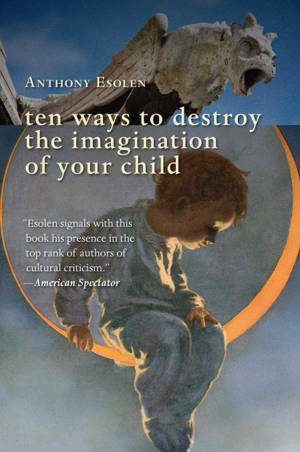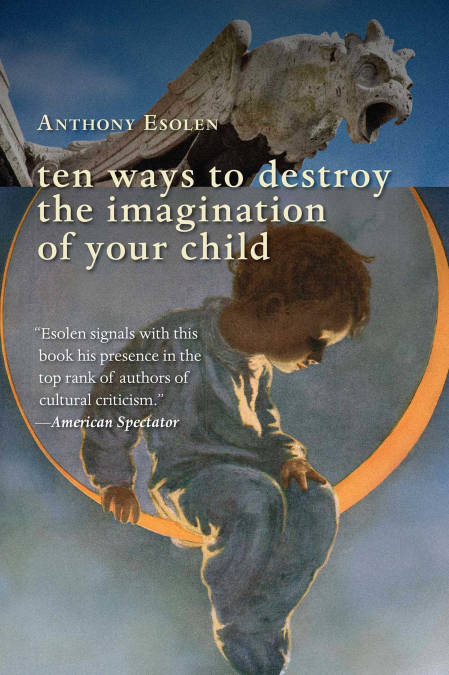
- Retrait gratuit dans votre magasin Club
- 7.000.000 titres dans notre catalogue
- Payer en toute sécurité
- Toujours un magasin près de chez vous
- Retrait gratuit dans votre magasin Club
- 7.000.0000 titres dans notre catalogue
- Payer en toute sécurité
- Toujours un magasin près de chez vous
14,53 €
+ 14 points
Description
Play dates, soccer practice, day care, political correctness, drudgery without facts, television, video games, constant supervision, endless distractions: these and other insidious trends in child rearing and education are now the hallmarks of childhood. As author Anthony Esolen demonstrates in this elegantly written, often wickedly funny book, almost everything we are doing to children now constricts their imaginations, usually to serve the ulterior motives of the constrictors.
Ten Ways to Destroy the Imagination of Your Child takes square aim at these accelerating trends, in a bitingly witty style reminiscent of C. S. Lewis, while offering parents—and children—hopeful alternatives. Esolen shows how imagination is snuffed out at practically every turn: in the rearing of children almost exclusively indoors; in the flattening of love to sex education, and sex education to prurience and hygiene; in the loss of traditional childhood games; in the refusal to allow children to organize themselves into teams; in the effacing of the glorious differences between the sexes; in the dismissal of the power of memory, which creates the worst of all possible worlds in school—drudgery without even the merit of imparting facts; in the strict separation of the child’s world from the adult’s; and in the denial of the transcendent, which places a low ceiling on the child’s developing spirit and mind.
But Esolen doesn’t stop at pointing out the problem; he offers clear solutions as well. With charming stories from his own boyhood and an assist from the master authors and thinkers of the Western tradition, Ten Ways to Destroy the Imagination of Your Child is a welcome respite from the overwhelming banality of contemporary culture. Interwoven throughout this indispensable guide to child rearing is a rich tapestry of the literature, music, art, and thought that once enriched the lives of American children.
Ten Ways to Destroy the Imagination of Your Child confronts contemporary trends in parenting and schooling by reclaiming lost traditions. This practical, insightful book is essential reading for any parent who cares about the paltry thing that childhood has become, and who wants to give a child something beyond the dull drone of today’s culture.
Ten Ways to Destroy the Imagination of Your Child takes square aim at these accelerating trends, in a bitingly witty style reminiscent of C. S. Lewis, while offering parents—and children—hopeful alternatives. Esolen shows how imagination is snuffed out at practically every turn: in the rearing of children almost exclusively indoors; in the flattening of love to sex education, and sex education to prurience and hygiene; in the loss of traditional childhood games; in the refusal to allow children to organize themselves into teams; in the effacing of the glorious differences between the sexes; in the dismissal of the power of memory, which creates the worst of all possible worlds in school—drudgery without even the merit of imparting facts; in the strict separation of the child’s world from the adult’s; and in the denial of the transcendent, which places a low ceiling on the child’s developing spirit and mind.
But Esolen doesn’t stop at pointing out the problem; he offers clear solutions as well. With charming stories from his own boyhood and an assist from the master authors and thinkers of the Western tradition, Ten Ways to Destroy the Imagination of Your Child is a welcome respite from the overwhelming banality of contemporary culture. Interwoven throughout this indispensable guide to child rearing is a rich tapestry of the literature, music, art, and thought that once enriched the lives of American children.
Ten Ways to Destroy the Imagination of Your Child confronts contemporary trends in parenting and schooling by reclaiming lost traditions. This practical, insightful book is essential reading for any parent who cares about the paltry thing that childhood has become, and who wants to give a child something beyond the dull drone of today’s culture.
Spécifications
Parties prenantes
- Auteur(s) :
- Editeur:
Contenu
- Nombre de pages :
- 272
- Langue:
- Anglais
Caractéristiques
- EAN:
- 9781684516575
- Date de parution :
- 17-07-23
- Format:
- Ebook
- Protection digitale:
- Adobe DRM
- Format numérique:
- ePub

Les avis
Nous publions uniquement les avis qui respectent les conditions requises. Consultez nos conditions pour les avis.






